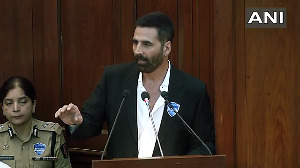Nine months after it was formed following the rout of the BJP-led National Democratic Alliance, the United Progressive Alliance stands menaced by a crisis of its own creation. The assembly election in Bihar, Jharkhand and Haryana offered the UPA a handsome opportunity to consolidate itself, further isolate the BJP, and impart a decisive Centre-Left orientation to politics.
The UPA squandered it and very nearly snatched defeat from the jaws of victory in Bihar and Jharkhand. Its triumph in Haryana, with almost a three-fourths majority, does not compensate for these setbacks. The UPA must learn some hard lessons.
In Jharkhand, the governor courted controversy by swearing in Shibu Soren although it wasn't clear that he enjoyed greater support than the NDA. The BJP feigns injured innocence at this. But its own conduct right since the late 1970s (when the Janata Party, of which it was part, wantonly dismissed numerous Congress governments) reeks of serious abuse -- witness Nitish Kumar's appointment in Bihar (2000), and toppling of governments in Goa, Arunachal, Manipur and Nagaland later.
Stop this nonsense about our great democracy!
We must see this in a larger perspective. All indications available before the nomination process pointed to a thumping victory for the UPA parties in Jharkhand. Had the UPA merely repeated its polling performance in the last Lok Sabha election, it would have won a three-fourths majority -- such was the ill-will generated by BJP Chief Minister Arjun Munda's tenure.
Besides, there was the 'sympathy' factor arising from Shibu Soren's arrest in a 30- year-old case pertaining to the agitation for a separate state. The upbeat mood in the Congress after its return to national power was expected to further boost the UPA.
However, the Congress mindlessly and unilaterally made a seat-sharing deal with the JMM, which excluded the RJD and the Left. This decision caused the secular alliance serious setbacks, which were aggravated by an intra-JMM split between Shibu Soren and Stephen Marandi, leading to the sabotage of the much-resented candidature of Soren's sons. The Congress failed to reach its own 2000 tally even as its divisive moves cost its allies a number of seats.
Evidently, the Congress forgot that broad-based alliances or coalitions have been a key to all its recent successes. It deluded itself that it was all set to re-emerge as the pre-eminent party of governance in the Hindi belt. It dreamt an old dream: the charisma of its leaders would be a substitute for the hard task of building the party by attracting cadres through programmes and policies that are relevant to the broad masses of plebeian classes and working people which have long been alienated from the Congress.
The self-delusion proved especially burdensome in Bihar where the Congress has singularly failed to relate to two paradigm-setting trends of the past one-and-a-half decades -- namely, 'Mandalisation' or rise of the middle castes (the Forward March of the Backwards); and second, self-assertion of the Dalits, who increasingly demand direct self-representation. A party which doesn't incorporate or reflect the energies these processes have unleashed cannot succeed in Bihar or Uttar Pradesh.
The Congress desperately looked for a shortcut to relevance and power in Bihar. It also wanted to cut Lalu Prasad to size nationally. Some Congress leaders thought Prasad, with his 'antediluvian' and 'populist' politics, was getting too big for his boots. If he were to lead the UPA to an emphatic victory in Bihar, he would demand a bigger share of central power, including the post of deputy prime minister. Besides, the Congress reckoned, the RJD's misgovernance in Bihar and its appalling development record would enhance its own popular appeal.
What better way to stop Prasad in his tracks and reduce his margin of victory than enter into an alliance with his sworn enemy, Ram Vilas Paswan?
Thus, the Congress made a series of absurd demands while bargaining with the RJD. In place of the 12 seats it held, it wanted 90-plus, 110, at one point, 115 seats! The Congress won just 10 seats thanks to its suicidal undermining of the UPA. The RJD's total too fell from 115 to 74, an erosion of a third of its tally. The result was a squarely hung assembly, where neither the UPA nor the NDA can form a government without Paswan's 29 seats, comprised mainly of goons and bahubalis.
Lalu Prasad too deserves to be blamed for two things. First, there's simply no doubt that he has become somewhat 'soft' and complacent over the 15 years the RJD has been in power. He has developed expensive indulgences and allowed sycophancy to grow around himself. This has dented his appeal a little and decreased his breathtaking ability to communicate with and mobilise the people. Second, the RJD fielded some 40 'bad' candidates at the instance of his two brothers-in-law (Sadhu and Subhash Yadav).
This, coupled with the Bihar government's remarkably bad failure to provide public services like roads, schools, hospitals and power, brought about a significant erosion in the RJD's vote. The Congress too cut into its Muslim base, especially in the first two phases of polling. Muslims (16.5 percent of the population), and Yadavs (13 percent), constitute the RJD's firm base in Bihar.
Having said this, it is nevertheless creditable for Lalu Prasad to have retained a good chunk of his loyal support-base -- despite the forces arrayed against him. These were formidable. Nearly every party opposed him. A good chunk of the bureaucracy, itself upper-caste, loathes Prasad's politics.
The media ran a hate campaign against him, ridiculing him as an inveterate populist and a Mandalite to be written off. And even the Election Commission passed unreasonable remarks against Prasad. (For instance, it said the Banerjee report on Godhra shouldn't even be referred to in the election campaign.) EC officials privately told some journalists they were 'fixing' Prasad!
The fact that the RJD continues to enjoy significant support despite having been in power in Bihar for 15 years is a tribute to the strength of identity politics based on low or middle caste assertion in Northern India. Prasad may have earned the hatred of the savarna media and anti-Mandal intelligentsia, but his politics is legitimate and relevant for many to whom he lent his voice or helped gain self-respect.
Until the aspirations of these underprivileged layers are accommodated by society, the space for Mandal-style identity politics will remain. And Prasad will remain significant within that space. Since 1977, no other leader has dominated a Northern state as totally as him.
What happens now? The Congress seems to have realised that it made a huge mistake in wrecking the UPA and says it will do its utmost to form a secular government in Bihar. There are probably only three ways this can happen.
One, the Congress prevails upon Paswan to join an RJD-Congress-Left government.
Two, the Congress-LJP form a minority government, which the RJD supports from the outside.
And third, the Janata Dal-United led by Nitish Kumar breaks away from the NDA and joins the secular alliance. This can happen immediately or after a brief spell of President's Rule. These possibilities appear more likely than that of Paswan joining a BJP-JD-U front.
Each possibility will involve a price and a trade-off. Paswan could be persuaded to join a government with the RJD in it only if he is given an important central portfolio and if an RJD nominee doesn't become chief minister. Prasad will drop his claim to form a government in Patna only if he is assured of a larger national role, etc.
The onus is on the Congress to make the right compromises so that a government controlled by the BJP doesn't come to power.
The Congress has another major obligation too. As the UPA's largest party, it must put the alliance on a sound political-organisational footing. This it can only do if it recognises that the UPA won the Lok Sabha election not only because of successful alliance-building, but also because it represented a Centre-Left Nehruvian platform critical of the NDA's neoliberal policies with all their inequities and injustices, as well as its divisive communal politics.
To be true to its mandate, the UPA must reflect both a Left-of-Centre 'progressive' orientation and a collective, alliance-based, 'united' character.
Regrettably, the Congress seems to be reluctant to abide by either requirement. Going by the Budget, it doesn't seem fully aware of the nature of its mandate. Despite some of its welcome schemes, the Budget by and large perpetuates neoliberal 'free-market' policies.
There is no structural change or change of direction -- in macro-economic parameters, in relations between government and private capital, in the emphasis on foreign direct investment, or on turning essential rights like those to water, healthcare and education into commodities to be sold at a profit.
This must change if the UPA is to gain popular legitimacy.
Is the Congress leadership awake and listening?





